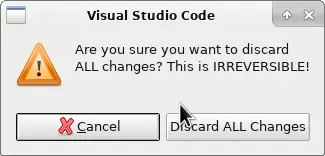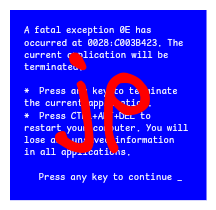The real issue is already going 3 months without source control.
The person didn’t have any git repository; probably a new programmer that didn’t know how version control works and just clicked discard without understanding what that means in this situation
I have heard things from another apprentice who just does not use version control at all and the only copies are on his laptop and on his desktop. He is also using node.js with only 1 class and doesn’t know about OOP (not sure if you even use that in js no clue 😅) and has one big file with 20k lines of code I have absolutely no clue how he navigates through it
Those are rookie numbers. I have at least a 35k one somewhere. More than one actually.
People run their businesses on this.
I once landed a job at a small company doing a software for medical analysis labs all over the country. Software had been around for over ten years at this point. They had no source control. Nothing. Absolute nightmare.
They were literally starting to use source control when I arrived.
In 2015.The “source control” when I first started was all the code on a shared drive, to check out a file you copied it to your machine, and renamed the extension on the shared drive to your initials.
When somebody edited without doing this there would be full blown meltdowns over lost work.
He just heard monoliths were in again
I know the type. Usually the kind of confident know-it-all who refuses to learn anything but delivers changes really quickly so management loves them. I had the misfortune to fix such a project after that ‘rock-star’ programmer left the company. Unfortunately the lack of professional standards in our industry allows people like that to continuously fail upwards. When I left the project they rehired them and let them design the v2 of the project we just fixed.
deleted by creator
My company for the longest time had two engineers they would give all the new projects to. They would rush through some prototype code as fast as they could then management would bring in a new team to take the project over. The code was always garbage and crammed into one place. I kept getting new projects and instead of starting from a nice clean slate we always had to build on that garbage. It sucked so bad.
Jesus, reminds me of a similar story. My gf once lost a job to someone who literally just pasted code into LLMs, also delivering quickly, even tho it was hot garbage. Anyhow, she spent a lot of her time fixing his shit and so her output went down. I hope that company burns to the ground with completely un manageable software.
When I left the project they rehired them and let them design the v2 of the project we just fixed.
Lol. Wow.
And that is why I’ve been unable to work myself out of a job in all my long years as a developer.
Ey! Reminds me of my middle-school years! I still can’t belive I made an entire game without a single class… Just storing info in arrays and writing in comments what location represents what data. But I was a literal child, too young to read guides or sit through “long” tutorials.
I don’t want to sound too mean, but whenever I see anything similar at work, I wish that person get a job they’re actually good at. It’s fine and all that the company started hiring actual programmers to fix things, but the fact that the old crew still fucks shit up with senior privileges is a major grievance.
Reading this just give me a panic attack
In case anyone else is wondering, or simply doesn’t like reading screen shots of text, this is apparently a real report:
Steps to Reproduce:
1.Go near this fucking shit editor.
2.Commit the deadly sin of touching the source control options.
🤣
- Ignore the scary warning VS Code shows you when you press the button.
I dunno, “discard changes” is usually not the same as “delete all files”
Nowadays the warning even says that this cannot be undone. Maybe that wasn’t present in 1.15, though.
It was. If you go through the OP thread, one of the responses is a picture of the dialog window that this user clicked through saying, “these changes will be IRREVERSIBLE”.
The OP was just playing with a new kind of fire (VSCodes Git/source control panel) that they didn’t understand, and they got burned.
We all gotta get burnt at least once, but it normally turns us into better devs in the end. I would bet money that this person uses source control now, as long as they are still coding.
If the “changes” are all your files, discarding them for me means basically delete my files, you know, the ones you are trying to add.
At the same time, OP seems a layman, and might be coming from things like Microsoft Word, where “Discard all changes” basically means “revert to last save”.
EDIT: After reading the related issues, OP may have also thought that “discard changes” was to uninitialise the repository, as opposed to wiping untracked files.
What exactly do you think discard means?
“Changes” are not the same thing as “files”.
I’d expect that files that are not in version control would not be touched.
Yeah. That’s discussed in more detail in the code change that resulted from the issue report.
It’s a ballsy move by the VSCode team to not only include
git cleanbut to keep it after numerous issue reports.As others discussed in that thread,
git cleanhas no business being offered in a graphical menu where a git novice may find it.That said, I do think the expanded warning mesage they added addresses the issue by calling my out that whatever
gitmay think, the user is about to lose some files.Apparently, it means changes to the directory structure and what files are in them, not changes within the files themselves. It really ought to be more clear about this.
Yeah. They did substantially modify the message to make it much clearer, thankfully.
It means both.
“Changes” encompass more than you think. Creating / Deleting files are also changes, not just edits to a file.
If the change is an edit to a tracked file, “Discard Changes” will reverse the edit. If the change is a new untracked file, “Discard Changes” will remove it as intended.
It can also be both at the same time, which is why VSCode uses “Changes” instead of “Files”.
If the change is a new untracked file
Wasn’t the issue that it deleted a bunch of preexisting untracked files? So old untracked files.
And the terminology is misleading, resulting in problems. shrug.
4. Complain about lack of a scary warning.
Pretty sure the scary warnings in big bold text are more recent than this report.
Nope. The scary warning is even screenshotted and used as an example in the post report discussion.
It’s quite the fun read!
Having done exactly 0 research, I going to assume it’s one of those “DO NOT PRESS OKAY UNLESS YOU ARE EXPERIENCED AND KNOW WHAT YOU ARE DOING” and someone went “pffft I know what I’m doing. click now what does this option do…”
reading through it, it sounds like they opened a project in VSCode, and it saw that there was a local git repo already initialized, with 3 months of changes uncommitted and not staged. So the options there are to stage the changes (
git add) to be committed or discard the changes (git checkout -- .). I guess they chose the discard option thinking it was a notification and i guess the filename would be added to gitignore or something? Instead, it discarded the changes, and to the user, it looked like VSCode didrm -rfand not that this was the behavior of git. Since the changes were never committed, evengit reflogcan’t save them.From this issue: https://github.com/microsoft/vscode/issues/32459
It appears that the behavior actually included a git clean. Which is insane in my opinion. Not sure if they changed it since, but there’s definitely a dev defending it.
He said they’re not going to change it, just make the dialog a lot more clear and add a second button to it that will only do a reset without the clean.
The second button is actually a pretty major change!
Yeah, it’s unclear to me at the time if the dialogue box in the screenshot appeared when doing a select all operation, but it reads as though the OP dev didn’t understand git, discarded their work, and got upset that it was an option.
Realistically if the dialogue box appeared, I’m not sure there would be anything else the IDE could do to prevent the dev from themselves. Perhaps reject operations affecting 5000 files? But then you’ll just have someone with the same issue for 4000 files.
The issue I linked has a very good analysis of the UX issues and several suggestions for fixing these. They went with a minor iteration on the original message box, which not only includes a clearer message and the number of files affected, but also defaults to not touching untracked files (while preserving the option to delete untracked files as before).
It appears that the behavior actually included a git clean. Which is insane in my opinion.
Yeah. Building a convenient accessible context free way to run
git clean…sure feels like the actions of someone who just wants to watch the world burn.
The dude ranted for awhile in the issue thread and closed the issue himself too! lol
This link was included in the post but I realize that “source” was probably not the best label for it. Updated to make it more clear.


Backups, backups, backups.
80% of my used storage accross all my drives (theyre a lot of them) is backups 💀
might be a little paranoid…? idk
Like, damn son, at least make a daily archive of your project??
You have to expect things to go wrong, otherwise you have no one but yourself to blame.
Doing a
git cleanis a dick move.Yeah, real developers do
git clean -dxf.The user clicked an option to “discard” all changes. They then got a very clear pop-up saying that this is destructive and cannot be undone (there’s a screenshot in the thread).
I very much understand how one can think this would revert any changes done to files under version control but not delete the ones that are not. I believe this dialog has since been updated to explicitly state that fact.
Yes, the dialog was changed, as part of this linked issue (and maybe again after that; this whole incident is very old). After reading some of the comments on that issue, I agree with the reasoning with some of the commenters that it would be less surprising for that menu option to behave like
git reset --hardand not delete tracked files.
I always found Git GUIs, especially the ones built into IDEs, to be more confusing and clunkier than working with Git on a terminal. It often feels like unlearning what one knows about Git, and relearning it the way that specific GUI demands.
Heck, I am going through the aforementioned feeling as I force myself to use Magit on Emacs. It just does not feel intuitive. But I will not give up until I have made an honest and full attempt.
The only sensible Git GUI I ever used is Sublime Merge[0], after a coworker praised it immensely. Even that is reserved for the rarest of the rare times when the changes in the workspace gets unwieldy and unruly. For every other instance: Git CLI on a terminal.
[0] https://www.sublimemerge.com/
E: typo, and link to mentioned GUI.
JetBrains has really nice Git integration. Interactive rebaseses and merges are quite pleasant but I’m still dipping into the command line to do stuff occasionally. Most commonly a
git reset HEAD~cause I want to split a commit though I had to dig through the reflog the other day cause I suddenly realized I lost an important branch that ended up being over a hundred commits back.How do you view diffs and merges when you say you don’t use git GUIs? External tool or terminal/command line?
I use Jetbrains IDEs and most of my life has been IDE based git interaction. And I honestly love it, easy access to see my diffs, the most common commit, push and stage(or shelve as Jetbrains does it, which is better than visual studio). Hassle free and available beats writing anything to me.
How do you view diffs and merges when you say you don’t use git GUIs? External tool or terminal/command line?
Terminal.
I use Jetbrains IDEs and most of my life has been IDE based git interaction. And I honestly love it, easy access to see my diffs, the most common commit, push and stage(or shelve as Jetbrains does it, which is better than visual studio). Hassle free and available beats writing anything to me.
Perhaps, it is a mix of learned behaviour and cognitive fixation, as I started out my development journey predominantly using a terminal, that I cannot fathom Git GUI being hassle free.
Nice to read a different perspective on such a fundamental thing that I take for granted while working. Thank you for sharing it.
If the files were already staged then git should have blobs in the git folder, so they should be recoverable.
Looks like they weren’t staged. He clicked on the staging option, it showed it would stage thousands of files, he said “hey I should fix my .gitignore” and clicked on what looked like either a “don’t stage” or a “forget” button, and it was a “checkout --force” button.
The most impressive thing is all the people doubling down on the idea that a “checkout --force” button in a main interaction screen is a great idea, there’s nothing wrong with the software, and the user is a moron.
“discard changes” button - the 5000 “new file created” changes, specifically.
Did you read the thread? There was a bug that deleted all files even ones unassociated with git.
Sounds like they weren’t even using version control, and had no business anywhere near a project that size.
had no business anywhere near a project that size.
Lol. That’s a really good point, actually.
I add version control around file number 3200…
(I’m kidding. Writing even a couple lines without version control makes my eye twitch.)
Even back in my super noob days, I’d keep known good working versions of the files in separate folders. I basically invented my own terrible source control system before I knew anything about svn or git.
Yeah. Same here. We learned to mistrust computers very early.
In reality, VSCode has local file history called “Timeline”. It’s enabled by default.
https://github.com/microsoft/vscode-docs/blob/vnext/release-notes/v1_66.md#local-history
In reality, that was added four and a half years after this issue was opened.
Oh, didn’t notice this was a 7 year old issue.
Understandable; no time to check details when your fuse is that short
5000 files
0 backups
Someone’s got their priorities mixed up.
having 5000 backups of 0 files is also kinda pointless.
Yeah, those are novice numbers. I have infinite backups of my 0 files!
And they were trying to correct their priorities by looking into the source control features, so I don’t see how that’s anything other than victim blaming for them not doing it sooner.
I would argue that it’s common sense to at least make a point in time copy, to… IDK, a USB drive? Before trying to implement a new source/control system.
Just plug in an external drive, or a thumb drive, copy/paste, unplug it, then proceed with testing.
I don’t see how anyone who values their time and effort could do any less.
As for the files, undelete is a thing, and it shouldn’t be hard to do.
You have to lose it all to know what matters (speaking from experience 😭)
I once lost three hours of work early on during my learning, not much that I lost but it was a moment when I learnt a lesson. Never lost work after that ever.
Skill issue
I don’t know anything about programming, i came here from /all, but it seems to me that a command that’s this permanently destructive warrants a second confirmation dialog message reminding the user that the files will be permanently deleted and not undoable
Here is the exact warning that a user had to click through in order to get to where they got:

That’s not a very good dialog box. He didn’t make any changes, so discarding them doesn’t sound like a problem.
There should be a notice when you enable source control that this will permanently delete all existing files with a checkbox (checked by default) that says “Add existing files to source control.”
He wouldn’t have seen the “Discard Changes” button at all if source control wasn’t already setup (and detected by VSCode).
No program will delete files either when you initialize source control.
My sibling ran into this issue once. I’m not sure if it’s a setting or a default, but vscode would assume they were working in a blank repo until they made a commit.
Sounds like this person had the project (without source control) in another IDE, tried out VSCode, and it assumed that it was all ‘changes’. I don’t use VSCode, do I can’t say for certain, but I know my sibling lost ~4 hours of project set up for the same reason (though they immediately realized it was their fault).
Reading your comment and #32459, I realize that VSCode source control did have some major issues back then.
It looks like they have improved though, as the latest VSCode I use doesn’t auto-initialize repositories anymore.
Hm ok yeah, that seems quite scary sounding so that i would strongly hesitate before clicking on “discard ALL changes”. Still, I wonder if a second confirmation dialog with more information is warranted for a command that’s so destructive.
I wouldn’t assume “discard changes” means “delete files that existed before the editor did”.
It’s changes from the prior commit in the repository, which, if they had not committed anything prior, would have been an empty directory.
This is perhaps a good lesson in teaching version control as its own concept rather than “streamlining it” by bundling it with an editor.
Ok then, the changes to the repository shouldve been discarded. Anything he uploaded shouldve been deleted from the server. Why were files on his local machine deleted?
The repository in Git isn’t on the server, it’s on your local machine.
What makes you think a server was involved here? It was a local repository, evidenced by the reporter’s bewilderment that files can be deleted without going to the Recycle Bin first. Which tells us that in addition to VCS, they were unfamiliar with Windows as well.
You shouldn’t be taking ownership of files and then deleting them without communication a hell of a lot better than that.
I understand what happened. I’m saying that if you’re going to delete stuff that was there before the software was, your flow to adding a project should include suggesting a base level commit of everything that’s there already.
That’s definitely fair, creating a repository in a non-empty directory could definitely suggest auto-committing the current state if it doesn’t already. I don’t use VSCode so I wouldn’t know.
Although now that I think about it, that could have been the intention here but not automatic, if that’s why 5k+ files were staged without the user explicitly staging them. Extra tragic if that’s the case.
Then you don’t understand git or source control in general. If you don’t commit your changes, then you discard any changes, you’re set back to the last commit. Discarding changes also includes any un-committed new files.
discarding changes does not discard uncommitted new files. The VS Code button did a
git cleanwhich is completely unexpected. Git even refers to a git clean with completely different terminology.git reset -> “Resets the index and working tree. Any changes to tracked files in the working tree since are discarded.”
git clean -> “Cleans the working tree by recursively removing files that are not under version control, starting from the current directory.”. This command also requires you to specify a force option to actually do something, else it quits with an error.
Note that git clean never once refers to discarding anything, and git reset never refers to removing untracked files. VS Code was doing an idiotic thing. Running
git reset --hardANDgit clean. There is absolutely no reason to be runninggit cleanfrom an UI button ever. If you want to remove a file you can explicitly remove it.Imagine that the button said “Discard all changes” and then it ran
rm -rf --no-preserve-root /*. Would that make sense as a button? No. It definitely would not.or like “unmount d:” but instead it formats d:
Which is exactly the situation the dude was in. As a newbie, it’s an easy mistake to make. Telling somebody who doesn’t know “well, would you look at that, you didn’t know!” is not just unhelpful, it’s useless and condescending.
It’s not that. It means discard all changes made after the last change committed to this local repository.
In this case it seems like it also performed a
git cleanand deleted his untracked files too. Someone actually opened a an issue to try and prevent the behaviour in the future
I guess cancelling would go back to the “Then you want to commit all files?” dialog, which the user didn’t want to, he just wanted to cancel whatever the IDE was trying to start.
The problem is that these are “source control basics” that everyone needs to learn the hard way once it seems.
Waiting 3 months in between commits however is a really bad rookie mistake because you were worried about making a commit that wasn’t perfect.
Imperfect commits never existed when you squash.
Interesting. I wouldn’t know, because I code everything perfectly the first time.
Disclaimer: The above flagrant lie was brought to you by my also using rebase and squash to hide all of my mistakes.
Squash ftw. Simpler clearer history.
the problem is that VS Code ran
git cleanif you clicked yes, which is completely idiotic behavior. No other git client, text editor, or IDE on the planet does that.Either way, waiting 3 months worth of work before a commit is the big mistake here.
I think they hadn’t ever used git before, and according to at least one person in the linked issue, vs code might have auto initialized the git repository for the user.
In fairness, ALL git terms feel backwards at first.
I think it’s important to know that this program is for code developers, and the issue here is with a tool called git. Git is like file saving on steroids, because on top of saving a single file, you save many changes to files in git, add a comment for why you made those changes, and share your changes across dozens of files with other developers.
What this guy did was develop for many months after starting to use git, but he never actually committed the files. Then he asked for to reset everything back to the original state, something that I do multiple times a day, and it gave him a warning that original means original and you will lose everything. And he said do it anyways.
No he asked for a discard after importing the project into VS Code. discard in git terms refers to
git reset, notgit clean. Even if he wanted to run agit resetthen this version of VS Code would have run agit cleanand deleted everything. Imagine he committed all 5000 files, but had a secret.json that he hadn’t committed. He didn’t add it to gitignore either. Running agit reset --hardwill not delete this file, but the VS Code button did exactly that because it ran agit clean.
They clicked discard changes, confirmed it, and the computer did as instructed. This operation is normally not so destructive as it only discards uncommitted changes to realign the local directory with the remote server. Unfortunately for user, it sounds like they have never committed a change, so realignment meant reverting to an empty folder.
Perhaps. Still I am not sure why someone who is not aware of this would be using VSC. If they are a student then what kind of project are they working on that they have so many files?
I’m sure 99% of the files were node modules. The npm bloat is real.
deleted by creator
While I have some sympathy for anyone who loses months of work, as an IT administrator by day, all I have to say about their lack of backups, and lack of RTFM before messing with shit is:
HAHAHAHAHAHAHA HAHAHAHAHA. you got what you deserved fucker. GL.YF.
Man I get paranoid about synchronization programs for this very reason. There’s usually some turnkey easy-mode enabled as soon as you first launch that’s like:
“Hey you wanna back up your entire NAS to your phone?! That’ll be fun, right?!”
And you’re like “…No.”
And then it wants to obliterate everything so it’s all “synchronized”, often it’s not easy to find a “No, stop, don’t do anything at all until I configure this.” Option.
iTunes was SO BAD about this.
Syncthing is the least-bad sync software I’ve ever run. It’s got some footguns but it’s still brilliant.
I would imagine there’s still ways to back up version controlled software right?
Honestly no idea why someone would go around a completely unknown menu in a new unknown editor and randomly click things with caution completely out the window. Not having a copy or trying a blank project, not even reading any messages. I mean even if we don’t know it’s a nuke button, God knows what other edits it could do to your code without you knowing.
This goes beyond rookie mistake. This is something 12 year old me would do. Same with the issue page being 90% swear words.
This is a disease of GUIs. Most people are so used to having their hands held and being unable to make a mistake that when a GUI actually gives you the power to fuck up they don’t expect it. I promise you, if this user was using the CLI, this wouldn’t have happened as easily.
I promise you, if this user
was using the CLIbacked up their files, this wouldn’t have happenedas easily.That too, but it seems like this was them attempting to back up their files. They just critically failed.
Using a program that’s not designed to be a backup solution that you are also unfamiliar with sounds even worse. Lol
Honestly no idea why editors give shit random names instead of using the terms git uses.
I find it amazing, how every time I see a git GUI I’m completely lost and that it’s always completely different, considering it’s the same app underneath and that app doesn’t have THAT many different functions.
I don’t even know why people ITT are blaming the IDE and completely ignoring this.
When you learn git, you do so on a dummy project, that has 5 files which are 10 characters long each.
An IDE is not made so you can’t break things, it is tool, and it should let you do things. It’s like complaining that Linux will let you delete your desktop environment. Some people actually want to delete your desktop environment. You can’t remove that option just because someone can accidentally do it by ignoring all the warnings.
Got will not delete untracked files though, which is what happened here. If you want to discard changes to a file with git, you first have to commit the file to the index at some point, which means there’s only ever so much damage an erroneous “git restore” or “git reset” can do. Specifically, neither of them will delete all the files in an existing project where VC has just been added.
This user was not using git though, he was using vs code. That button doesn’t say “git reset” it says “discard all changes”. And btw, what it does is “git clean”, which is something that git can do.
Just below the button there is a list of all the changes. In his case, there were 3000 changes of the type “file creation”. Discarding a file creation can only be made one way: deleting the file.
Anyway, this user is presumably in his learning phase, I would not assume that he knows what git reset or git restore actually do.
Fair enough, git clean does exist. However, if the button saying “discard all changes” is really a button that runs
git clean, that’s just a plain terrible design choice.git cleanis “delete all untracked files”, which is specifically not discarding changes, because there can be no changes to discard on an untracked file. Even talking about “changes” to an untracked file in VC context makes little sense, because the VC system doesn’t know anything about any changes to the file, only whether it exists or not.That’s not even mentioning the fact that the option to “git clean” shows up as one of the easily accessible options in relation to a staging process. Especially if you’re coming from the git CLI, you’re likely to associate “discard changes” with “git restore”.
In other IDEs this discards tracked changes, untracked files usually stay untouched.
In my opinion, it’s a combination of user error and bad implementation here
Mein Gott!
Yeah, I guess I’ve got to leave it like that now…
Linus Sebastian enters the chat
They could have a warning though. I agree with you, but there are some easy ways to prevent this from happening. It just takes time to implement, and would be required in other places too. Is it worth the dev time? I doubt it.
Right? “You are about to permanently delete 5,345 files, they will not be sent to the recycling bin, are you sure?”
There is a warning. IIRC it says “are you sure you want to discard all changes? This action is unreverisble”. In the context of version management. Creating a file is a change. And just below the button to discard all changes is the list of changes. In that list he could’ve seen 3000 changes of the type “file creation”, when you discard a file creation, it means to undo the creation, which is a deletion.
The button days what is going to do. There is a warning about what it’s going to do. And there is a list of the exact changes it’s going to undo.
The only way to avoid this from happening is to not have the button exist. In that case, the users that actually want to discard all changes would be unable to do so.
I fucking HATE when abstractions over git use cutesy names that git doesn’t use.


























